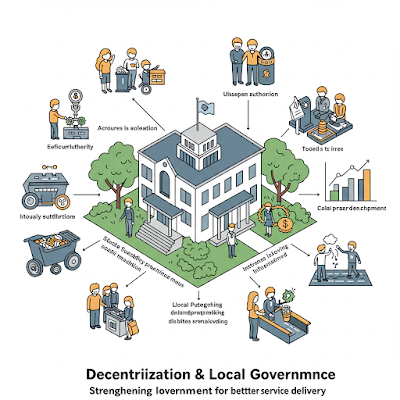As urban populations continue to grow, cities worldwide face numerous challenges, including traffic congestion, pollution, inefficient public services, and resource management issues. The concept of smart cities has emerged as a revolutionary approach to addressing these challenges through technology-driven solutions. By integrating advanced technologies like the Internet of Things (IoT), Artificial Intelligence (AI), Big Data, and Blockchain, smart cities enhance urban governance, improve public services, and create sustainable urban environments.
This article explores the role of smart cities in urban governance, key challenges, technological solutions, and successful case studies.
The Concept of Smart Cities
A smart city is an urban area that uses digital technology, data analytics, and intelligent infrastructure to optimize resource use, improve quality of life, and ensure efficient governance. Key aspects of smart cities include:
-
Smart Governance: Digital governance systems that ensure transparency and efficiency.
-
Smart Mobility: Intelligent transport solutions to reduce congestion and enhance connectivity.
-
Smart Energy: Use of renewable energy and energy-efficient infrastructure.
-
Smart Waste Management: Technology-driven waste collection and recycling systems.
-
Smart Healthcare: Telemedicine, AI diagnostics, and digital health records.
-
Smart Security: AI-powered surveillance and predictive policing for safer urban environments.
Urban Governance in Smart Cities
Effective urban governance in smart cities relies on data-driven decision-making, citizen participation, and digital solutions. Key elements include:
1. Digital Governance & E-Government
-
Online portals for public services (e.g., tax payments, permits, and grievances).
-
Blockchain for secure and transparent governance records.
-
AI-powered chatbots for real-time citizen assistance.
2. Data-Driven Decision-Making
-
Big Data Analytics to predict urban challenges (e.g., traffic patterns, pollution levels).
-
GIS Mapping for urban planning and resource management.
-
IoT Sensors to monitor city infrastructure and optimize services.
3. Citizen Engagement & Participation
-
Mobile applications for feedback and real-time issue reporting.
-
Digital platforms for participatory budgeting and policy discussions.
-
AI-powered analytics for citizen sentiment analysis and policy recommendations.
Challenges in Urban Governance and Smart City Development
Despite the benefits, implementing smart cities presents several challenges:
1. High Implementation Costs
-
Smart infrastructure requires significant investment in technology and connectivity.
-
Financial constraints limit the adoption of advanced solutions in developing regions.
2. Data Privacy and Cybersecurity Risks
-
The collection and analysis of large amounts of citizen data raise privacy concerns.
-
Cybersecurity threats, including hacking and data breaches, pose risks to smart city networks.
3. Digital Divide and Accessibility
-
Unequal access to digital services can marginalize certain populations.
-
Bridging the digital divide requires widespread internet access and digital literacy programs.
4. Interoperability and Integration Issues
-
Different technology providers use various systems, making integration difficult.
-
Standardized frameworks and open-source platforms are needed for seamless connectivity.
Technology-Driven Solutions for Smart Cities
To overcome these challenges, cities are leveraging innovative technologies to enhance urban governance and improve quality of life.
1. Internet of Things (IoT) for Smart Infrastructure
-
Smart Traffic Management: IoT-enabled traffic lights that adjust based on congestion levels.
-
Smart Street Lighting: Energy-efficient LED lights that adjust brightness based on usage.
-
Smart Water Management: IoT sensors that detect leaks and optimize water distribution.
2. Artificial Intelligence (AI) for Predictive Governance
-
AI-powered predictive policing to reduce crime rates.
-
Machine learning algorithms for urban planning and land use optimization.
-
AI chatbots for automated public service assistance.
3. Blockchain for Transparency and Security
-
Digital identity management for secure public service access.
-
Decentralized records for property rights and financial transactions.
-
Secure voting platforms for digital elections and citizen participation.
4. 5G Connectivity for Seamless Smart City Operations
-
High-speed data transmission to support smart city applications.
-
Enhanced connectivity for IoT devices, AI, and cloud computing.
-
Remote work and education infrastructure to bridge the digital divide.
Success Stories: Smart Cities Around the World
1. Singapore – The Global Leader in Smart Governance
Singapore has developed a comprehensive Smart Nation Initiative with features such as:
-
AI-powered traffic control to reduce congestion.
-
Nationwide digital identity for secure access to government services.
-
Smart waste management with AI-driven recycling stations.
2. Barcelona – IoT-Driven Urban Transformation
Barcelona has implemented IoT solutions to enhance urban living, including:
-
Smart parking sensors to guide drivers to available spots.
-
Digital bus stops with real-time information and free Wi-Fi.
-
Smart irrigation systems that reduce water consumption by 25%.
3. Dubai – AI and Blockchain for Future Governance
Dubai aims to be the first city fully powered by blockchain technology, with:
-
AI-powered police stations without human officers.
-
Blockchain-based government transactions to eliminate paper-based processes.
-
Smart grid energy management for sustainability.
4. Copenhagen – Green and Sustainable Smart City
Copenhagen integrates smart technologies to achieve sustainability goals:
-
Carbon-neutral initiatives using smart grids and renewable energy.
-
Bicycle-sharing systems with real-time data tracking.
-
Smart heating solutions to optimize energy consumption.
The Future of Smart Cities and Urban Governance
The next phase of smart city evolution will focus on:
1. AI-Driven Autonomous Systems
-
Self-driving public transport systems to reduce congestion.
-
AI-powered urban planning for adaptive city infrastructure.
2. Expansion of Digital Twins
-
Virtual city models for real-time analysis and decision-making.
-
Predictive simulations for disaster management and infrastructure planning.
3. Sustainable and Resilient Cities
-
Climate-responsive urban planning for eco-friendly cities.
-
Circular economy models for waste reduction and resource optimization.
4. Decentralized Governance Models
-
Blockchain-enabled governance for secure digital voting.
-
AI-driven policymaking based on real-time citizen feedback.
Conclusion
Smart cities are transforming urban governance by integrating technology-driven solutions to address complex urban challenges. Through AI, IoT, Blockchain, and Big Data, governments can enhance efficiency, improve public services, and ensure sustainable urban development. However, overcoming challenges such as high costs, cybersecurity threats, and the digital divide requires strategic planning, public-private partnerships, and citizen engagement. As technology continues to evolve, the future of smart cities will bring more inclusive, transparent, and sustainable urban ecosystems, shaping the cities of tomorrow.





